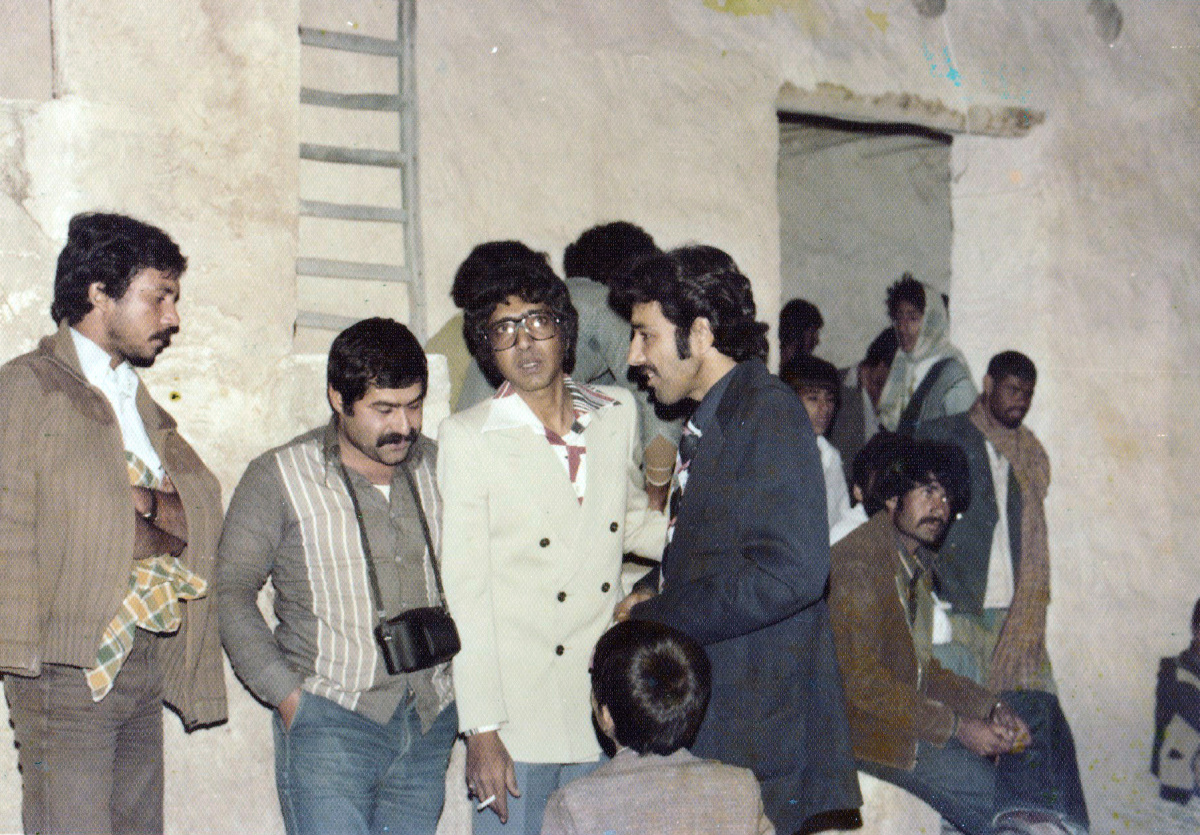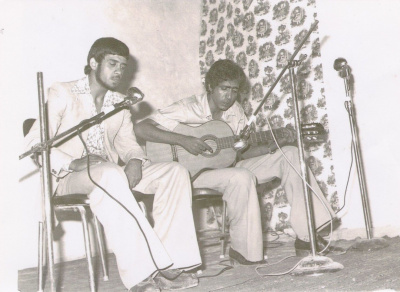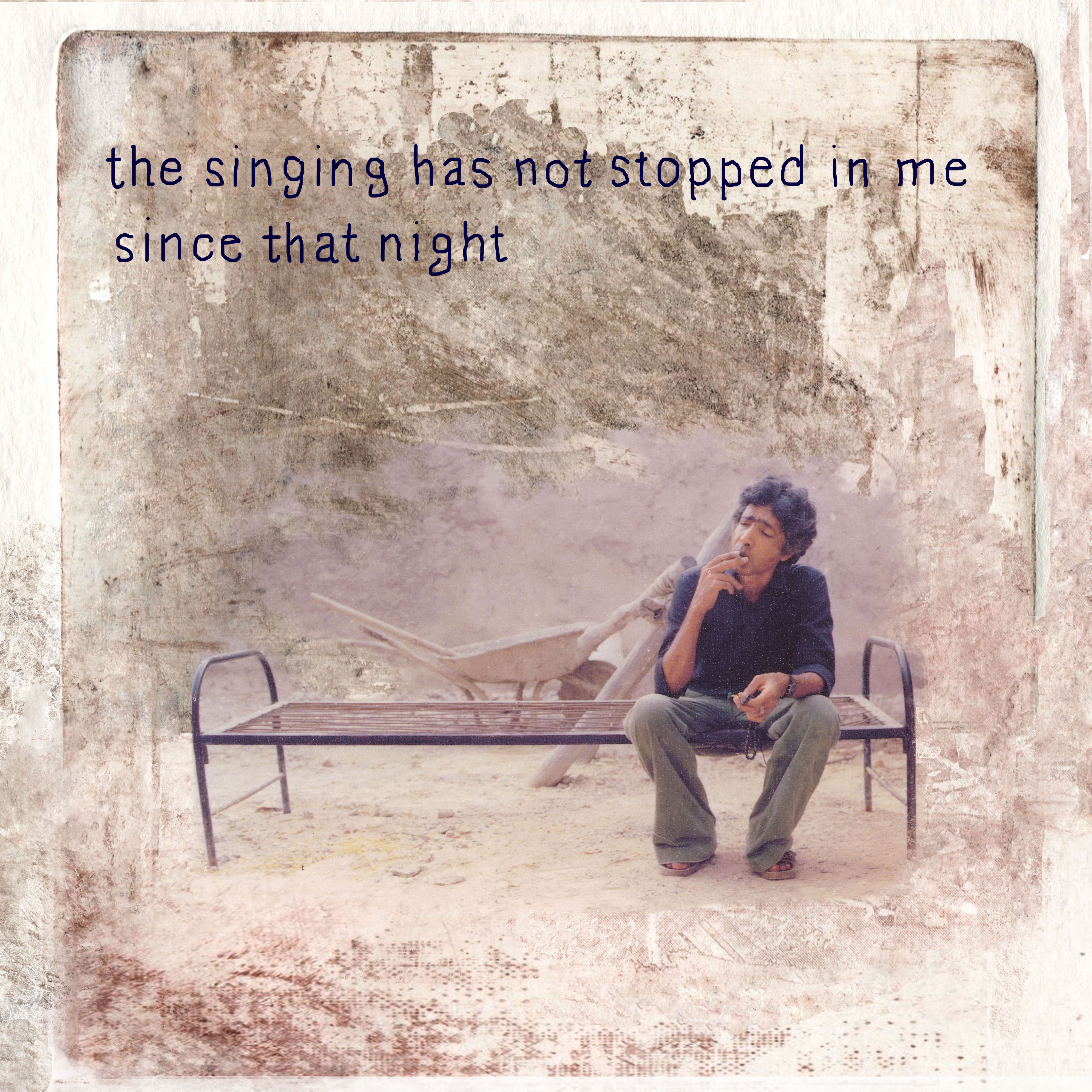
Ebram the Breeze
Somewhere between truth and fiction and floating on a spirit breeze, Azin Feizabadi assesses the myth and legacy of one of Iran’s most beloved singer/songwriters, Ebrahim Monsefi – the subject of Kamran Heidari’s «documentary», None of Your Business.
→ Check all articles of this special
→ Download PDF with introduction and table of contents
«… Barely do I recall where I was wandering all these years.
And neither do I have an idea what keeps bringing me back here.»
These are the words spoken in a calm but confused male voice, while we slowly enter into a city from a bird’s-eye view, like a tender breeze. The questions the voice asks are the same that I too ask myself every time I come back to Bandar Abbas, the Iranian city in the Hormuzgan Province depicted in the opening scene of None of Your Business. The voice in the film belongs to a fictionalized version of the late Hormuzgani singer and songwriter Ebrahim Monsefi. Monsefi is introduced here as a breeze, or a wind. A Hormuzgani would call such a breeze a «Baad», and they would tell you that there are many Baads – such as the Zaar wind, the Noban, the Mshayekh, the Jinn, the Fairy, the Bogey, or the Bugaboo and so on – with different tasks. But can a living creature become a Baad?
Facts and Truth Are Not Always the Same Thing
None of Your Business, by director Kamran Heidari, is a biographical take on Monsefi, or Ebram, whose life ended too soon in 1997, at 52 years old. A tragic anti-hero, his songs still enjoy popularity throughout Iran. If you spend time in the culturally diverse Hormuzgan, there is no way Monsefi’s name is not mentioned or his tapes not played for you. But it wasn’t until the end of 2019 that I really grasped what he means to anyone connected to the place.

In Bandar Abbas, at a movie premier of another documentary about Monsefi, original tapes of his songs were played in the film. Young and old, male and female, literally everyone in the cinema was singing, humming, or chanting the lyrics together. Some were crying, others laughing – there was no frame in the film without a collective reaction from the audience. Even I, unsure of the lyrics, sang and hummed with my Bandar Abbasi colleagues and friends, and cried and laughed as if I had been listening to his music all my life. Upon exiting the cinema with the rest of the 300-strong audience, a sudden wind began to blow and the crowd dispersed into nearby cafés or taxis. No weather app had warned or even recorded any wind or rain at the time. Something strange was floating in the air. Some might explain this experience as nostalgia or romanticism, others as «Jav Zadegi» (a Farsi phrase which means to be taken away by the ambience), but I trust there is more to it, because the singing has not stopped in me since that night. Even back in Berlin, while shopping at the supermarket, on a Zoom call, at a protest, in the metro, or simply late at night while sleeping, a sudden urge pushes me to sing out loud, somehow knowing Ebram’s lyrics, chanting them from the bottom of my heart.
Whether I’m good or bad
Beautiful or ugly
Left to my own device, writing about the pain of love
It’s None of Your Business
It’s None of Your Business
It’s None of Your Business
If pain is always my companion
If I dig my own grave
If I’m destined to remain unhappy
If I’m always complaining about misfortunes
If I am idle, fruitless and weak
If I’m old to everyone but feel young at heart
Whether I’m good or bad
If I feel no one knows my pain
No one knows my pain
If I am an old tree with no fruit
It’s None of Your Business
It’s None of Your Business
It’s None of Your Business
None of Your Business, named after Monsefi’s famous song of the same name, is not a conventional documentary. Even the director himself claims that he has made neither documentary nor fictional film. Heidari uses the term «magical realism» to describe his approach. It consists of two main narrative lines woven together. While a tired male voice recounts the life of Ebram from a first-person point of view – telling of his unrequited lovesickness for «Amis», his self-imposed exile into a dry no man’s land seeking solitude, the loss of his son, his drug addiction, and finally his suicide-like death – sequences of various musicians cut the narration into chapters. Staged in different locations and sometimes odd situations, the musicians each interpret a love or lamentation song of Monsefi, giving the narration meaning. They appear as testimonials for his life, becoming Ebram. The intensity of their performances, the passion in their voices, and the truth in their eyes testify to the existence of Ebram’s breeze.
The Wind of Bandar Abbas
Monsefi cannot be described in one sentence, one film, or one book. He might breeze into you or not. If he does, you’ll feel it – you’ll understand his pain and sorrow, humor, lovesickness, or strangeness. If he doesn’t, you will be left cold and he will remain ungraspable to you. Ebram’s soul moves in Heidari’s film; it has breezed into the various protagonists. Now I understand how he, despite his long physical absence, continues to exist as a Baad into the spirit of the Hormuzgani people. The question of whether a living creature can become a Baad is irrelevant. The same applies to the question of whether the short story told here is fiction or true. As Ebram recounts in the closing scene of None of Your Business:
«The stories I have told you about my life
I can’t tell which ones are real and which ones are not
since one is alive with one’s imagination.»
The film «None of Your Business» by Kamran Heidari was officially selected at the Norient Film Festival NFF 2021. See full program here.
This text is part of Norient’s essay publication «Nothing Sounds the Way It Looks», published in 2021 as part of the Norient Film Festival 2021.
Bibliographic Record: Rhensius, Philipp. 2021. «Editorial: NFF 2021 Essay Collection.» In Nothing Sounds the Way It Looks, edited by Philipp Rhensius and Lisa Blanning (NFF Essay Collection 2021). Bern: Norient. (Link).
Biography
Published on December 16, 2020
Last updated on April 09, 2024
Topics
What happens when a Muscovite electronic producer meets Circassian folk musicians? What rules are needed for intercultural cooperation between individuals?
From world known reggae musicians fighting against the devil to the black metal scene in Indonesia.
Snap


